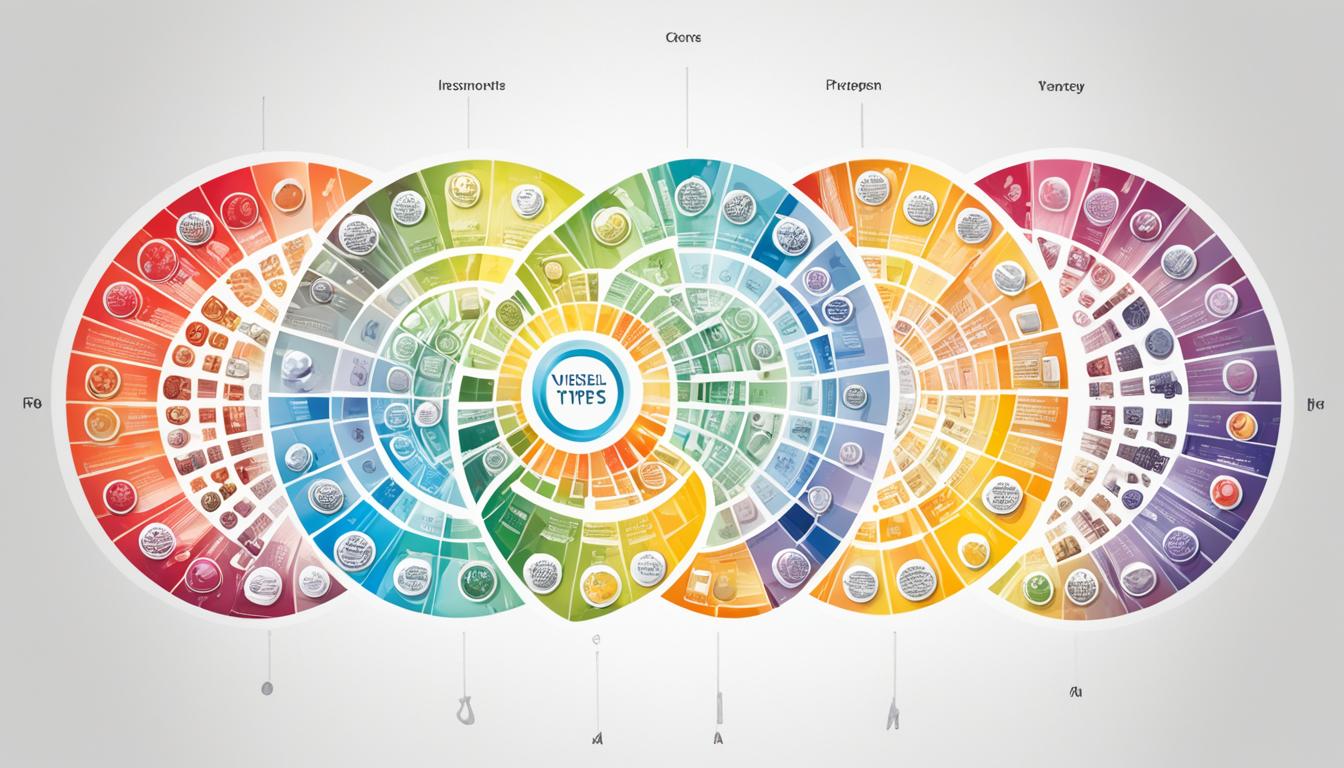Were you aware that projective personality tests have been utilized for many years to delve into the deepest recesses of the human mind? These psychological evaluations, aimed at uncovering unconscious thoughts, emotions, and desires, have proven to be invaluable to psychologists and professionals across different industries.
Now, you can dive into the world of projective personality tests and deepen your understanding with the help of Quizlet, the online learning platform with a wealth of resources at your fingertips. Our comprehensive Quizlet guide will equip you with the knowledge and tools you need to navigate the fascinating realm of projective personality tests.
Key Takeaways:
- Projective personality tests unveil hidden aspects of an individual’s personality by using ambiguous stimuli to elicit responses.
- These tests play a crucial role in clinical settings, helping professionals diagnose and treat mental health conditions.
- Common projective personality tests include the Rorschach inkblot test and the Thematic Apperception Test (TAT).
- Quizlet offers a range of study materials, including flashcards and practice quizzes, to enhance your understanding of projective personality tests.
- Using Quizlet for projective personality test study provides collaborative learning opportunities, performance tracking, and customizable study modes.
What Are Projective Personality Tests?
Projective personality tests are psychological assessments that utilize ambiguous stimuli to elicit responses from individuals. These tests are built on the premise that test-takers will project their unconscious thoughts and emotions onto the stimuli, consequently revealing hidden aspects of their personality.
Projective personality tests offer valuable insights into an individual’s psyche, allowing professionals to gain a deeper understanding of their underlying motives, conflicts, and psychological well-being. By uncovering these unconscious thoughts and emotions, these tests contribute to a more comprehensive assessment of an individual’s personality.
Examples of projective personality tests include the renowned Rorschach inkblot test and the Thematic Apperception Test (TAT). The Rorschach inkblot test involves presenting individuals with a series of 10 inkblots and asking them to interpret what they see. On the other hand, the Thematic Apperception Test (TAT) requires individuals to create stories based on ambiguous pictures, offering insight into their thought processes and emotional tendencies.
Projective personality tests provide a unique approach to understanding the intricacies of an individual’s personality by delving into their unconscious mind. These tests go beyond surface-level characteristics, aiming to uncover the hidden dimensions of an individual’s thoughts, emotions, and desires.
To better comprehend the nature of projective personality tests, let’s take a closer look at two of the most recognized assessments: the Rorschach inkblot test and the Thematic Apperception Test (TAT).
Rorschach Inkblot Test
The Rorschach inkblot test, developed by Hermann Rorschach in the 1920s, presents individuals with a series of inkblots and asks them to interpret what they see. The test-takers’ responses provide insights into their perceptual tendencies, emotional responses, and cognitive styles. It helps uncover their unique perspectives and underlying psychological processes.
Thematic Apperception Test (TAT)
The Thematic Apperception Test (TAT) involves showing individuals ambiguous pictures and prompting them to create stories based on these images. The narratives they construct help reveal their motivations, desires, fears, and conflicts, providing a deeper understanding of their personality structure and dynamics.

Rorschach inkblot testA test where individuals interpret a series of inkblots, providing insights into their perceptual tendencies, emotional responses, and cognitive styles.Thematic Apperception Test (TAT)A test involving ambiguous pictures, where individuals construct stories to uncover their motivations, desires, fears, and conflicts.
The Importance of Projective Personality Tests
Projective personality tests play a crucial role in understanding individuals on a deeper psychological level. These assessments provide valuable insights into an individual’s personality by uncovering hidden motives, conflicts, and issues that may not be readily apparent in other types of tests. Professionals in clinical settings often rely on projective personality tests to aid in the diagnosis and treatment of mental health conditions, as they offer a unique window into the unconscious thoughts and emotions of the test-taker.
By tapping into the depths of the mind, projective personality tests contribute to a more comprehensive understanding of an individual’s psychological well-being. They go beyond surface-level responses and delve into the subconscious, revealing aspects of personality that may otherwise remain concealed. This deeper understanding can inform therapeutic interventions, allowing mental health professionals to provide more tailored and effective treatments.
“Projective personality tests provide a window into the unconscious, allowing us to gain insights into an individual’s personality that may not be accessible through other means of assessment. They help us understand the deeper layers of the human mind and provide valuable information for therapeutic interventions.”
The Clinical Significance
In the field of psychology, projective personality tests hold great importance due to their clinical significance. They offer a unique approach to uncovering unconscious thoughts, allowing mental health professionals to gain a better understanding of the internal conflicts and complexities individuals may be experiencing. This knowledge is especially valuable for clinicians working with patients who struggle to verbalize their emotions or are unaware of their unconscious motivations.
Projective personality tests assist in diagnosing various mental health conditions, such as personality disorders, trauma-related disorders, and mood disorders. They can also shed light on an individual’s coping mechanisms, defense mechanisms, and overall psychological functioning. By revealing these underlying factors, projective personality tests aid in the development of more targeted treatment plans and therapeutic interventions.
Beyond Clinical Settings
While projective personality tests are extensively used in clinical settings, their significance extends beyond the realm of therapy. Industries such as human resources, forensic psychology, and market research utilize these tests to gain insights into individuals’ personality traits and behaviors. Projective personality tests can provide valuable information for hiring decisions, criminal profiling, and consumer research, allowing professionals in different fields to make informed judgments based on a person’s deeper psychological makeup.
Moreover, projective personality tests open avenues for self-reflection and personal growth. Individuals can gain a better understanding of their own unconscious thoughts, emotions, and motivations through these tests. This self-awareness can facilitate personal development, improve decision-making skills, and enhance interpersonal relationships.

The Bottom Line
Projective personality tests hold immense importance in understanding individuals’ psychological makeup and providing valuable insights into their personality. From diagnosing mental health conditions to informing therapeutic interventions and aiding decision-making processes in various fields, these tests offer a unique perspective into the depths of the human mind. By exploring unconscious thoughts and emotions, projective personality tests contribute to a more holistic understanding of individuals and their psychological well-being.
Common Projective Personality Tests
There are several commonly used projective personality tests that provide valuable insights into individuals’ unconscious thoughts and emotions. These tests help professionals understand underlying motives, conflicts, and issues. Let’s explore some of the most popular projective personality tests:
Rorschach Inkblot Test
The Rorschach inkblot test is a widely known projective personality test. It involves presenting individuals with 10 inkblots and asking them to interpret what they see. The test-takers’ responses are believed to reflect their unconscious thoughts and perceptions. This test is widely used in clinical settings and can offer valuable insights into an individual’s personality.
Thematic Apperception Test (TAT)
The Thematic Apperception Test (TAT) is another commonly used projective personality test. It consists of showing individuals ambiguous pictures and asking them to create stories about the images. The stories they create are then analyzed to understand their underlying motivations, fears, and desires. The TAT provides a deeper understanding of an individual’s personality and can be used in various contexts, including research and clinical assessments.
House-Tree-Person Test
The House-Tree-Person test is a projective personality test where individuals are asked to draw a house, a tree, and a person. The drawings are then interpreted to gain insights into the test-takers’ personality characteristics, emotional state, and cognitive functioning. This test can be used to assess a wide range of psychological issues, such as emotional disturbances and cognitive impairments.
Sentence Completion Test
The Sentence Completion Test is a projective personality assessment where individuals are given incomplete sentences and asked to complete them with their own thoughts and feelings. These responses are analyzed to reveal unconscious aspects of the test-takers’ personality and provide insights into their self-perception, motivations, and attitudes. This test can be a valuable tool in understanding an individual’s underlying psychological dynamics.
These projective personality tests offer unique ways to explore an individual’s unconscious thoughts and emotions. Each test provides valuable insights into different aspects of personality, contributing to a better understanding of psychological well-being.

Using Quizlet for Projective Personality Test Study
Quizlet offers a wide range of study materials for individuals interested in learning about projective personality tests. With Quizlet, you can access flashcards, practice quizzes, and study sets created by other Quizlet users. These resources provide an interactive and engaging way to review concepts and enhance your understanding of projective personality tests.
One of the key advantages of Quizlet is its extensive library of user-generated content. You can benefit from the shared knowledge and expertise of other learners, who have created study materials specifically tailored to projective personality tests. By leveraging these resources, you can gain different perspectives and deepen your insights into this fascinating field of psychology.
Quizlet’s mobile app allows you to study on the go, making it convenient and accessible for learners with busy schedules. Whether you’re commuting, waiting for an appointment, or taking a break, you can make the most of your time by reviewing projective personality test concepts using Quizlet.
Engaging with Quizlet for your projective personality test study can provide a significant boost to your learning experience. By utilizing these study materials, you can reinforce your knowledge, practice important concepts, and increase your confidence in understanding and interpreting projective personality tests.

With Quizlet’s user-friendly interface and diverse study modes, you have the flexibility to customize your learning process. Whether you prefer flashcards, practice quizzes, or interactive study sets, Quizlet has the resources to accommodate your learning style.
“Quizlet has been a game-changer for my projective personality test study. The flashcards and study sets have helped me grasp complex concepts and memorize important information. It’s become an essential tool in my learning journey.” – Sarah, Psychology Student
Quizlet also offers performance tracking tools that enable you to monitor your progress and identify areas for improvement. By leveraging these features, you can set goals, track your learning milestones, and stay motivated throughout your projective personality test study.
Benefits of Using Quizlet for Projective Personality Test Study:
- Access to a vast library of study materials created by other Quizlet users
- Interactive and engaging resources, such as flashcards and practice quizzes
- Convenient mobile app for studying on the go
- Multiple study modes to cater to individual learning preferences
- Performance tracking tools for monitoring progress and setting goals
By utilizing Quizlet for your projective personality test study, you can enhance your learning experience and gain a deeper understanding of this fascinating field. Quizlet’s comprehensive study materials, user-generated content, and convenient mobile app make it an invaluable resource for learners pursuing knowledge in projective personality tests.
Benefits of Using Quizlet for Projective Personality Test Study
Using Quizlet for projective personality test study offers numerous benefits. The platform provides a collaborative learning environment where users can engage with study materials created by others. Quizlet’s spaced repetition feature helps reinforce knowledge and improve long-term retention. The platform also offers various study modes, allowing users to customize their learning experience. Furthermore, Quizlet provides performance tracking tools, enabling users to monitor their progress and identify areas for improvement.
Collaborative Learning Environment
Quizlet provides a collaborative learning environment where users can access study materials created by others. By leveraging the collective knowledge and insights of the Quizlet community, individuals studying projective personality tests can benefit from a wide range of perspectives and resources. This collaborative aspect enhances the learning experience and promotes a deeper understanding of the subject matter.
Spaced Repetition for Improved Retention
Quizlet’s spaced repetition feature is a powerful tool for enhancing knowledge retention. By strategically timing the review of study materials, Quizlet ensures that information is reinforced at optimal intervals. This technique has been shown to improve long-term retention and facilitate better recall during exams or assessments.
Customizable Study Modes
Quizlet offers various study modes that cater to different learning preferences. Whether users prefer flashcards, quizzes, or other interactive study methods, Quizlet provides the flexibility to customize the learning experience. This adaptability allows individuals to choose the study mode that best suits their learning style, making the process more engaging and effective.
Performance Tracking Tools
Quizlet’s performance tracking tools enable users to monitor their progress and identify areas for improvement. By tracking study sessions, quiz scores, and other performance metrics, individuals can gain valuable insights into their strengths and weaknesses. This data-driven approach allows for targeted studying and ensures that time is spent on areas that need further attention.

| Benefits | Quizlet | Traditional Study Methods |
|---|---|---|
| Collaborative Learning Environment | ✔ | |
| Spaced Repetition for Improved Retention | ✔ | |
| Customizable Study Modes | ✔ | |
| Performance Tracking Tools | ✔ |
Tips for Effective Projective Personality Test Study on Quizlet
To maximize the effectiveness of projective personality test study on Quizlet, consider the following tips:
- Create your own flashcards to reinforce learning.
- Engage with the Quizlet community and explore study sets created by others.
- Utilize different study modes to cater to your learning preferences.
- Set achievable goals and track your progress regularly.
- Make use of Quizlet’s mobile app to study anytime, anywhere.

By following these tips, you can enhance your study experience on Quizlet and make the most of its resources for projective personality test learning.
Resources for Further Exploration
If you are interested in delving deeper into projective personality tests, there are several additional resources you can explore. Books such as “Projective Techniques in Personality Assessment” by Karen Machover and “The Thematic Apperception Test: The Theory and Technique of Interpretation” by Joseph D. Lichtenberg provide in-depth information on specific tests. Online articles and research papers can also provide valuable insights into the field of projective personality testing.
By referring to these resources, you can augment your knowledge and understanding of projective personality tests, enhancing your proficiency in this area of study.

“Projective Techniques in Personality Assessment” by Karen Machover is a comprehensive guide that delves into various projective personality tests, their administration, and interpretation. This book offers valuable insights into the theoretical foundations of these tests and their applications in the field of personality assessment.
“The Thematic Apperception Test: The Theory and Technique of Interpretation” by Joseph D. Lichtenberg is an authoritative resource that focuses specifically on the Thematic Apperception Test (TAT). This book provides a deep understanding of the test’s underlying principles, interpretation techniques, and clinical applications.
“Projective personality tests offer a unique window into individuals’ unconscious thoughts and emotions. By exploring resources such as books and research papers, learners can gain a comprehensive understanding of these tests and deepen their knowledge in this fascinating field of psychology.”
Additionally, online articles and research papers can provide valuable insights and keep you up to date with the latest developments and advancements in projective personality testing. Make use of academic databases and search engines to discover scholarly articles and research studies that delve into specific aspects of projective personality tests.
Limitations of Projective Personality Tests
While projective personality tests can offer valuable insights into individuals’ unconscious thoughts and emotions, it is crucial to consider their limitations. These tests rely heavily on subjective interpretations, making them susceptible to the biases of the examiner. This subjectivity can introduce potential inaccuracies and inconsistencies in the results, limiting their reliability.
Moreover, projective personality tests require extensive training and expertise to administer and interpret accurately. The complexity of these tests makes it crucial to have professionals who are well-versed in the specific methodologies and theories behind each test. Without proper training, misinterpretations can occur, leading to erroneous conclusions about an individual’s personality traits or psychological well-being.
To mitigate these limitations, projective personality tests should be used in conjunction with other assessment methods for a comprehensive evaluation. By considering various sources of information and combining different psychological tests, professionals can attain a more holistic understanding of an individual’s personality and psychological profile.
Overall, while projective personality tests have their merits, it is essential to recognize their constraints and approach their interpretation with caution and expertise.
Conclusion
This comprehensive guide has provided an overview of projective personality tests and how Quizlet can support your study of these assessments. Projective personality tests offer unique insights into individuals’ unconscious thoughts and emotions, contributing to a more thorough understanding of their personality and mental well-being. By utilizing Quizlet’s resources and following effective study strategies, you can enhance your understanding of projective personality tests and their applications in the field of psychology.
Whether you are a student looking to expand your knowledge or a professional in the field of psychology, Quizlet can be a valuable tool for studying projective personality tests. With its wide range of study materials and interactive features, Quizlet provides an engaging and accessible platform to deepen your understanding of these assessments. By harnessing the power of Quizlet, you can develop a solid foundation in projective personality testing and apply it to various areas of psychological research and practice.
Remember, projective personality tests are just one piece of the puzzle when it comes to understanding individuals’ complex inner worlds. While these tests can provide valuable insights, it is important to consider their limitations and use them in conjunction with other assessment methods. By taking a comprehensive approach, you can ensure a more accurate and holistic understanding of individuals’ personalities and psychological well-being.
Can I Use the Jordan Peterson Personality Test as a Projective Personality Test?
Yes, you can use the Jordan Peterson personality test as a projective personality test. The test measures the Big Five personality traits and can be a useful tool for understanding an individual’s underlying psychological traits and tendencies. It’s important to use it in conjunction with other assessment methods for a comprehensive understanding.
FAQ
What are projective personality tests?
Projective personality tests are psychological assessments that use ambiguous stimuli to elicit responses from individuals. These tests aim to reveal a person’s unconscious thoughts, feelings, and desires by having test-takers project their hidden aspects of personality onto the stimuli.
What is Quizlet?
Quizlet is an online learning platform that offers resources for studying various topics. It provides flashcards, practice quizzes, and study sets created by users, including materials for projective personality tests.
Why are projective personality tests important?
Projective personality tests provide valuable insights into an individual’s personality, helping professionals understand underlying motives, conflicts, and issues. They are particularly useful in clinical settings for diagnosing and treating mental health conditions.
What are some common projective personality tests?
Common projective personality tests include the Rorschach inkblot test, the Thematic Apperception Test (TAT), the House-Tree-Person test, and the Sentence Completion Test.
How can Quizlet support projective personality test study?
Quizlet offers a wide range of study materials for projective personality tests, including flashcards, practice quizzes, and study sets created by other users. Its mobile app allows for convenient and on-the-go studying.
What are the benefits of using Quizlet for projective personality test study?
Using Quizlet for projective personality test study provides a collaborative learning environment, spaced repetition for reinforcing knowledge, customizable study modes, and performance tracking tools to monitor progress and identify areas for improvement.
What tips can be helpful for effective projective personality test study on Quizlet?
Some tips for effective projective personality test study on Quizlet include creating your own flashcards, engaging with the Quizlet community, utilizing different study modes, setting achievable goals, and making use of the mobile app for studying anytime, anywhere.
What are some resources for further exploration of projective personality tests?
Further exploration of projective personality tests can be done through books such as “Projective Techniques in Personality Assessment” by Karen Machover and “The Thematic Apperception Test: The Theory and Technique of Interpretation” by Joseph D. Lichtenberg, as well as online articles and research papers.
What are the limitations of projective personality tests?
Projective personality tests rely on subjective interpretations and can be influenced by the biases of the examiner. The results may not always be reliable or consistent. Additionally, administering and interpreting these tests accurately requires extensive training and expertise.









